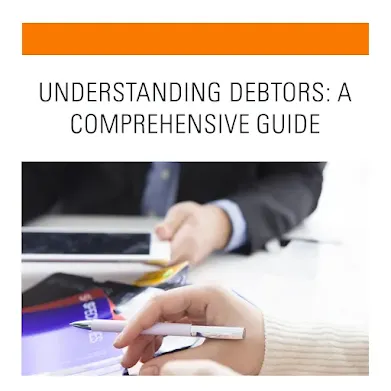 |
| Understanding Debtors: Their Role and Different Types |
Introduction:
In the realm of finance and accounting, debtors play a significant role. A debtor is an individual, business, or entity that owes money to another party. In this article, we will delve into the fundamental aspects of debtors, exploring their role, and discussing the various types of debtors.
Role of Debtors:
Debtors are a crucial part of the financial landscape, as they represent the counterparties who owe funds to a company or an individual. Whether you're a small business owner or an individual managing personal finances, understanding the role of debtors is essential. Debtors can include clients who have not yet paid for products or services, individuals with outstanding loans, or even governments with unpaid dues.
Types of Debtors:
1) Trade Debtors:
Trade debtors, also known as accounts receivable, are entities that owe money to a business for goods or services provided. This type of debtor is often seen in everyday transactions, such as when a customer purchases products on credit. As a business owner, it's crucial to manage trade debtors efficiently to maintain healthy cash flow.
2) Loan Debtors:
Loan debtors encompass individuals or entities that have borrowed money from a lender and are obligated to repay it over a specified period. This category includes personal loans, business loans, mortgages, and more. Managing loan debtors involves monitoring repayment schedules and ensuring timely payments to avoid defaults.
3) Government Debtors:
Government debtors involve cases where governmental bodies owe money to private entities or other governments. This could encompass unpaid taxes, fines, or even financial obligations between nations. Governments often have complex debt structures that require careful management and negotiation.
4) Bad Debtors:
Bad debtors are those debtors who are unlikely to fulfill their financial obligations. They may face financial hardships, become insolvent, or intentionally default on payments. Businesses and individuals must identify and address bad debtors to minimize financial risks.
5) Individuals Owed Money:
In certain cases, individuals can also become creditors, owed money by debtors. For example, if you lend money to a friend or family member, you become a creditor, and they become a debtor. It's important to establish clear terms and agreements when dealing with personal loans.
Conclusion:
Debtors are an integral part of the financial ecosystem, with diverse roles and types that impact individuals and businesses alike. Understanding the various types of debtors and their roles is essential for effective financial management. By staying informed and implementing sound strategies, you can navigate debtor relationships while maintaining a healthy and informed financial environment.
